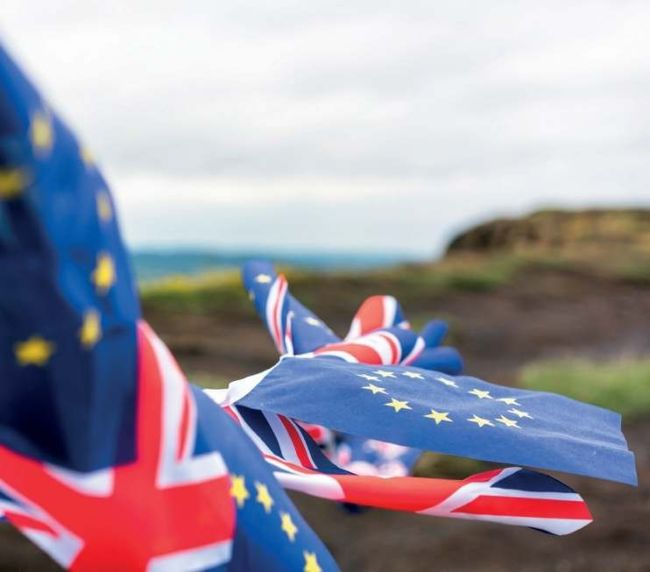Healing the wounds
Thomas Baldwin considers the role the Church has to play in healing polarised division.

image: iStock
“Where are we? We are divided. Those divisions are not going to go away, whatever decision [we] may reach. For each of us there is and will remain a continuing imperative of engagement with those who do not share our views.” - Lord Hodge, convener of the Special Commission on Same-Sex Relationships and the Ministry, addressing the 2011 General Assembly of the Church of Scotland.
BY THE time you read this, the UK may be around a month away from leaving the European Union. Or it may not. As I write, in very late January, Brexit is still due on March 29, but the plausible outcomes range from no-deal Brexit to no Brexit at all, a second referendum, a general election and the extension of Article 50 into the summer.
The only thing that is certain is that emotions are running high. Insults fly on social media, journalists and politicians are harassed and abused outside Parliament. MPs opposing Brexit have reported receiving death threats – threats that cannot be lightly dismissed, in the light of the murder of Jo Cox just before the referendum in June 2016.
It’s equally clear that these divisions will not be healed, at least not in the near future. Whatever the final outcome, whenever it comes, a significant proportion of the population will remain angry.
And it’s not just the UK: with far-right populism making inroads around the world and the violence around the gilets jaunes protests in France this winter, it feels like the world is more dangerous than it has been in decades.
In this climate, is there a role for the churches in helping to lower the temperature of the debate, to demonstrate that it is possible to disagree well?
In the aftermath of Parliament’s rejection of the EU Withdrawal Agreement, the Rev Dr Richard Frazer, Convener of the Church and Society Council of the Church of Scotland, called for ‘a different approach’ to the debate.
He said: “Reconciliation across our divided society needs a different approach, one in which we can take a deliberately slower and more thoughtful approach to discerning our future relationship with the EU.
“We need a much more respectful dialogue, one which is based on listening attentively rather than shouting louder.
“The Westminster Parliament and UK Government must work actively towards consensus in all parts of the UK about our future relationship with the EU and to use whatever mechanisms are necessary to create the time for this to happen.
“What we do, and how we do it, over these coming weeks will have an impact not just for the next few years but for generations to come.”
On a practical level, the Church and Society Council last year led three consultation events in coastal communities, areas which may have felt marginalised by the debate - Westray in Orkney, Cullen in Moray and Mallaig in the West Highlands - to explore the impact of leaving the EU in each of these areas.
Chloe Clemmons, the Scottish Churches Parliamentary Officer, says: “People who attended the events emphasised their strong sense of local identity which was bound up with fishing and the sea as well as the economic importance of tourism.
“While the public debate about Brexit has been focussed on politicians in the centres of decision-making in London and Edinburgh, these conversations at the edges of Scotland were a way of listening to the voices of the people whose everyday lives will be changed by leaving the EU.”
The Very Rev Dr John Chalmers also emphasises the importance of listening. Dr Chalmers has been at the centre of reconciliation efforts in various situations: as Moderator to the General Assembly during the Church of Scotland’s Respectful Dialogue events during the Scottish independence referendum in 2014; as Principal Clerk to the General Assembly for seven years at the height of the Church’s own divisive debates on human sexuality; and also playing a key part in the Church’s peacebuilding work in South Sudan.
He says: “My journey into the world of Respectful Dialogue began as a result of recognising that in every role I have ever had, from parish ministry to Principal Clerk, I have been required to understand three things.
“First, that I cannot always rely on my feelings and if the world was full of people who simply followed their feelings then we would walk headlong into a lifetime of discontent and embattlement.
“In this climate, is there a role for the churches in helping to lower the temperature of the debate, to demonstrate that it is possible to disagree well?
“What we need to function is more than intuition – it is the faculty of critical thinking. This raises the conversation above our emotions and beyond our feelings – to the place where our critical faculties engage with the facts and examine the evidence and begin the process of (at the very least) considering the possibility that the other person in the conversation may have something important to say.
“The second is to realise that the issues which people present with are seldom the real issue that is getting under their skin. So, attentive listening becomes extraordinarily important as the vehicle by which we drill down to the matters which really have to be addressed. If, as pastoral practitioners, we do not have the patience or the capacity for this kind of engagement, we will encounter an endless succession of conflicted relationships and we probably shouldn’t be in the business.
“The third is this: that everything in the world is not a battle between good and evil, right and wrong, my way or the highway. Sometimes there are solutions which are win/win rather than win/lose or, worse, win/ destroy. We don’t have to act as tribal forces do. We can look for compromises or we can learn to live with our differences. Sometimes equally valid points of view simply have to be held in dynamic tension.
“These three things add up to the need for every single one of us to able to exercise the craft of mediation. And, in fact, to some extent or another some sort of safe passage through life requires us to use this skill.”
Dr Chalmers adds that peace-building and the ministry of reconciliation has its roots in the work of Jesus, quoting 2 Corinthians chapter 5 – ‘God, who reconciled us to himself through Christ and gave us the ministry of reconciliation’.
He adds: “It was in the course of training and collaboration with some of the most highly skilled mediators that the criteria and the principles for Respectful Dialogue were developed. This was done under the banner of a movement entitled Collaborative Scotland.
“In 2014 as the Independence Referendum got under way we said this:

Image: iStock
“We believe that it is a privilege to be able to engage in discussions about our future. How we engage with each other may be just as important as any outcome. We believe that it is in the interests of a flourishing Scotland and our own community that our discussions are conducted with civility and dignity.
“We believe that it is a privilege to be able to engage in discussions about our future. How we engage with each other may be just as important as any outcome. We believe that it is in the interests of a flourishing Scotland and our own community that our discussions are conducted with civility and dignity. Therefore, we undertake to do our best and encourage others to do their best, and to:
. Show respect and courtesy towards all those who are engaged in these discussions, whatever views they hold;
. Acknowledge that there are many differing, deeply held and valid points of view;
. Use language carefully and avoid personal or other remarks which might cause unnecessary offence;
. Listen carefully to all points of view and seek fully to understand what concerns and motivates those with differing views from our own;
. Ask questions for clarification when we may not understand what others are saying or proposing;
. Express our own views clearly and honestly with transparency about our motives and our interests;
. Respond to questions asked of us with clarity and openness and, whenever we can, with credible information;
. Look for common ground and shared interests at all times.’”
The organisation Place for Hope arose out of concern about how the Church of Scotland handles conflict, initially internally. Now an independent charity, it is best known for helping congregations deal with disputes, but also offers learning programmes to help places of worship become reconciling presences in their community.
It is currently piloting a programme in Glasgow, in which churches work towards becoming recognised in their local communities as ‘a place for hope’.
Place for Hope ran a series of ‘Community Dialogues’ after both the independence and Brexit referendums, hosting spaces where opposing views could be aired and deep emotions shared in a safe and constructive space. Further sessions may be held in April, whatever happens on March 29.
The Rev Ruth Harvey, a Church of Scotland minister, is the Director of Place for Hope. For her, reconciliation is part of the search for Christian unity.
She says: “For many of us Christ’s call to unity is the bedrock on which our faith stands, and the lens through which we approach our calling. The unity we seek is a unity in diversity. This is no ‘lowest-common denominator’ uniformity, but a complex web of human relationships exploring deep connections of the spirit, rooted in Gospelinspired action for justice and peace.
“This is a call to unity which transcends any debate about ‘the state of the union’, whether that of our islands or our continent.
“Within Place for Hope we aim to model what we teach about reconciliation It’s not easy. We look for unity in the differences that we display within our own organisational life as well as without. Neither are we immune from human error, nor are we reaching for an unattainable perfection. Rather we hold before us a vision of reconciliation – of unity in the spirit – that transcends difference while honouring diversity.
“What then do we pray for in and through Brexit?
“We pray for a tone of conversation that is gracious, generous, and open.
“We pray for an attitude of listening predicated on a desire to understand (and be changed by) the other, more than to press home our own point.
“We pray for a desire to ask deep questions about the strong stance of those whose position is at odds with our own.
“We pray for a calmness and a vigour in equal measure, in the way we talk with one another.
“And we pray for a way into stillness, and the divine, that is the ‘inward source of our strength’.
“All these we pray for our political and religious leaders in the days and the months – and the years – ahead. Then we may transform lives and reform hearts.”
In the approach to the parliamentary debate on the EU withdrawal bill, the Church of Scotland issued a prayer written by the Rev Dr Martin Johnstone, Secretary to the Church and Society Council. In part, it read:
“God, we pray for your church of which we are a part: that we might be a place of honest reflection; respectful dialogue; open friendship; humility and reconciliation.
“We pray that we might be a community that points to heaven, and shows ways in which heaven is glimpsed on earth.”

Image: iStock